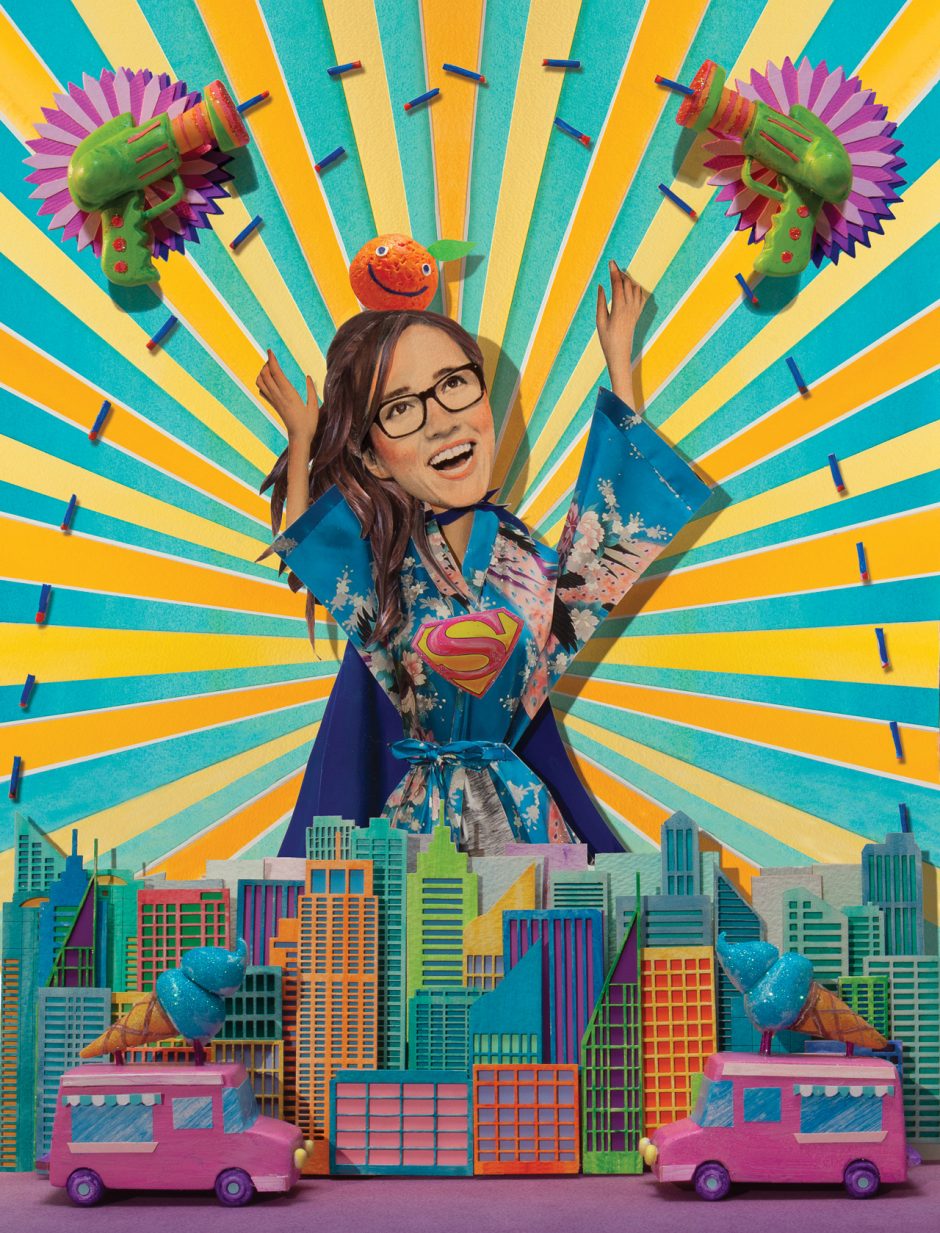
Published on Show Me Mizzou May 5, 2021
Story by Marina Shifrin, BJ ’10 | Illustration by Pushart
The first thing I noticed about Boyle Heights, my new neighborhood near the heart of Los Angeles, was the ice-cream trucks. Plural. Every evening, dueling ice-cream trucks would languidly roll into the ’hood and blast their peppy jingles into the dilapidated bungalows lining the streets. Hearing “I’m a Little Teapot” pierce through closed windows at night is jarring. Hearing the song played alongside “Do Your Ears Hang Low?” is maddening. Whether it’s raining, shining or global pandemic-ing, the trucks stick to their meandering journey. The sun always sets, and, shortly after, their tunes reverberate off the gabled roofs and directly into my brain.
In October 2019, my husband, Sam, and I bought one of those ancient Craftsman bungalows at an intersection where the ice-cream trucks like to idle. Initially, we laughed at the absurdity of this new soundtrack. Then we got used to it, the shrill recordings disappearing into the background of our evenings. Occasionally, I’d find myself humming the nursery rhymes while cooking dinner, but other than that, I wouldn’t notice them unless a visitor pointed it out:
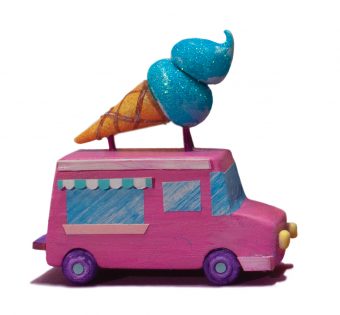 “IT’S LIKE THEY’RE INSIDE THE HOUSE,” my father shouted over the trucks the first time he came over. His voice echoed through the still-empty rooms, lined with unpacked boxes. I shut my eyes as the jolly tunes grew discordant. “THESE ARCHED CEILINGS ARE GORGEOUS. IS THAT CROWN MOLDING?” my dad added. Before I had the chance to respond, I was carried away by a wave of oxycodone.
“IT’S LIKE THEY’RE INSIDE THE HOUSE,” my father shouted over the trucks the first time he came over. His voice echoed through the still-empty rooms, lined with unpacked boxes. I shut my eyes as the jolly tunes grew discordant. “THESE ARCHED CEILINGS ARE GORGEOUS. IS THAT CROWN MOLDING?” my dad added. Before I had the chance to respond, I was carried away by a wave of oxycodone.
My doctor prescribed the narcotics after a young mother in a Kia Niro used my body as a speed bump. The collision resulted in collapsed lungs, a fractured pelvis, shattered leg and broken arm. Putting me back together required emergency surgery, a titanium rod, some screws and a blood transfusion. All this to say, I do not recommend getting hit by a car.
I’ve now been in three major car accidents, each increasing in severity. The first one happened on move-in day freshman year at Mizzou when a semitruck driver fell asleep at the wheel and drove through my minivan. The second took place shortly after I arrived in Los Angeles when a gas-pedal-happy 22-year-old triggered a three-car pileup, which then slammed into my little, red Honda. The ferocious momentum of the impact caused my neck to curl over the headrest. Both collisions left my car totaled, both experiences rattled my soul against my ribs, both events I was lucky enough to walk away from. This most recent accident, however, was a different beast.
The day of the wreck, I was taking my trusty 150-cubic-centimeter scooter out to meet a new co-worker, Brandy. We were on a two-week work-from-home schedule in order to write our respective episodes of a comedy series, Crossing Swords, which appears on Hulu. Brandy and I decided to meet at a coffee shop to help each other avoid the procrastination endemic to comedy writers. As I picked out the perfect “TV Writer” outfit, my stomach fluttered with nervous anticipation. This was my first official TV writing job, and I was terrified of messing it up. Every morning before work, I’d wake up, take a deep breath and vow to not let imposter syndrome get in my way. I guess I should’ve vowed not to let a subcompact sport utility vehicle get in my way instead.
In the moments after the accident, while I was almost literally kissing pavement, a strange sense came over me. Stronger than pain or frustration was a feeling of euphoria, as if all of the best experiences in my life combined into this one moment. Lying there in the intersection of Sunset and Hollywood boulevards, I physically understood, for the first time, how thin the barrier between life and total obliteration was. As I watched a pool of deep-red blood collect on the ground in front of me, a wave of gratitude coursed through my broken body. There, juxtaposed with death, I felt more alive than ever before.
When the EMTs came, I was delighted to see they were all certified LA hunks. If you’re going to be scraped off the side of the road, the least you can ask for is attractive scenery. “You guys think you can drop me off in Vegas?” I asked, eliciting some chuckles from my new boyfriends. Despite the fact that I was in the middle of publicly being cut out of my “TV Writer” clothes, I was more preoccupied with missing my family’s celebration of my cousin’s 40th birthday in Nevada that weekend.
As I looked over the contraptions holding my body together, I vowed not to tell my father about my injuries until he was basically at the craps table. I knew if I told Vladimir, he’d immediately book a flight to LA to be by my side, holding my hand, saying, “I told you that thing was too dangerous.”
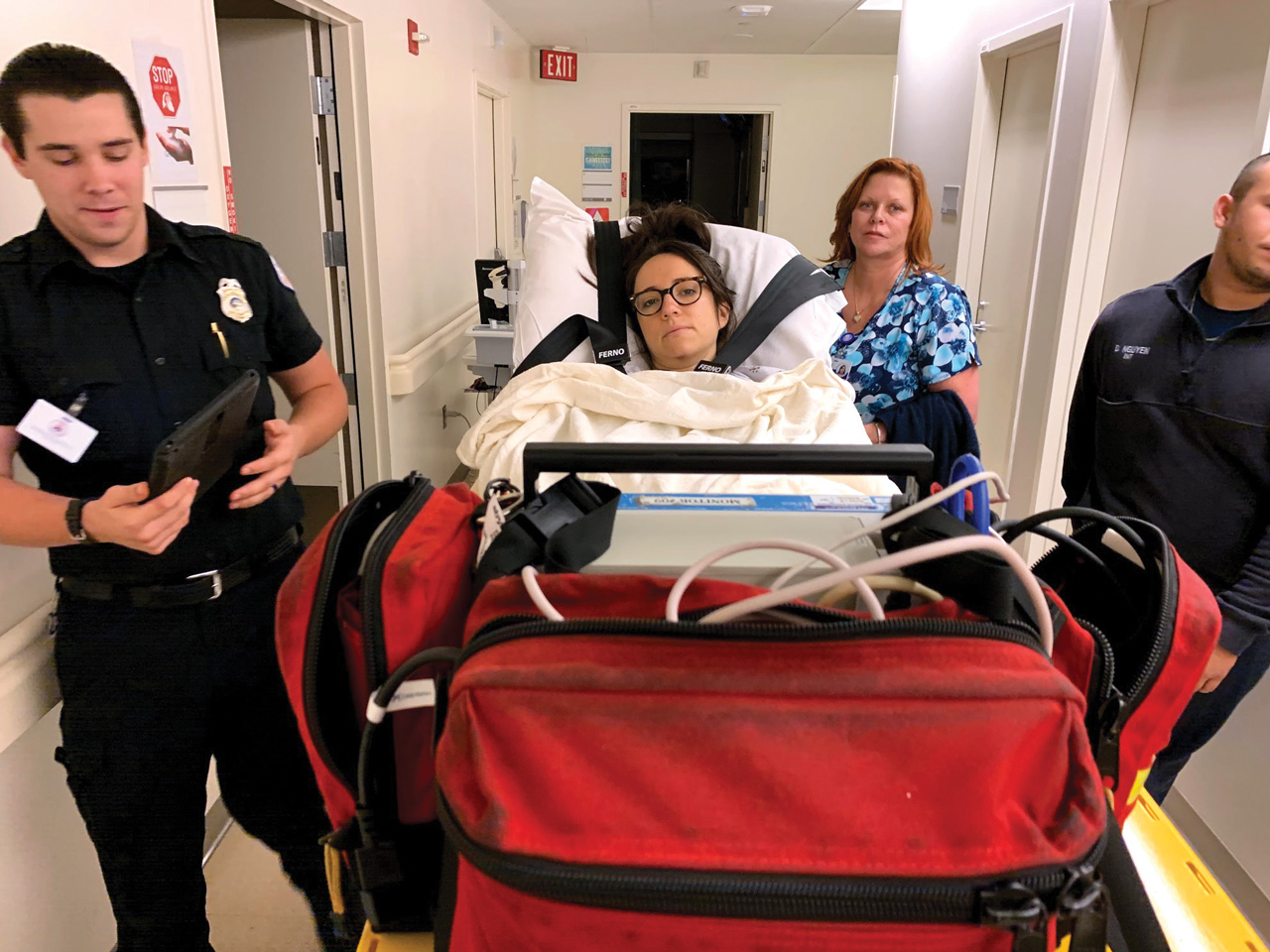
My first-ever trip to the emergency room was surprisingly quiet, boring even, compared to the chaotic scenes I’d seen in the movies. Sadly, there were no chiseled doctors shouting medical jargon at one another while frantically pushing my bed down a harshly lit hallway. Instead, I was rolled into a large room with cloth dividers where I’d remain without food or water for the next 15 hours.
Sam miraculously arrived minutes later — I still shudder to think how fast he must’ve driven from his office. To this day, I gleefully recount every morbid detail to anyone who will listen, but one part that remains painful is reliving the look on Sam’s face when he first saw me. It is the only time I have witnessed his heart break, and I hope to never see it again.
A common experience for those who have spent a non-negligible amount of time in any hospital is that there is a lot of waiting that happens. Waiting on scans. Waiting on a room. Waiting on more scans. Waiting on insurance. Waiting on surgery. Waiting on even more scans. I spent a total of 190 hours waiting. This forced slowdown was excruciating at first. But with freedom from all responsibilities and nothing to do but sleep, breathe and consume oxycodone — I began to think. A lot. And my mind kept drifting back to the elated feeling I experienced after impact, more specifically, how desperately I wanted to make everyone around me feel elated, too. Levity seemed essential to my survival, a visceral need that could help rebuild my shattered body.
This revelation came 10 years into my comedy career at a time when I was still unable to make a living wage. Doggedly pursuing my dream career was admirable, cute even, as a 20-something. But now I had a husband and mortgage. Try as I might to avoid it, I was staring adulthood in the face — seemingly no closer to my “big break.” This made me antsy and jaded. When would I feel like I’ve made it?
After putting most of my life savings into a 100-year-old home, it felt as though the instability of my career was no longer sustainable. We needed a fridge, air conditioning, a functioning garage door, and all of these things required money — something I spent the majority of my career avoiding. To further complicate things, I’d sometimes catch a melty look on Sam’s face when he’d see a baby. “Aw,” he’d coo, “sooo cute.”
“Stop it,” I’d hiss through clenched teeth, worried that his swooning would somehow result in a child of our own. Regardless of whether we were ready to have a baby or, more importantly, air conditioning, it was at least time for me to figure out what a 401(k) was.
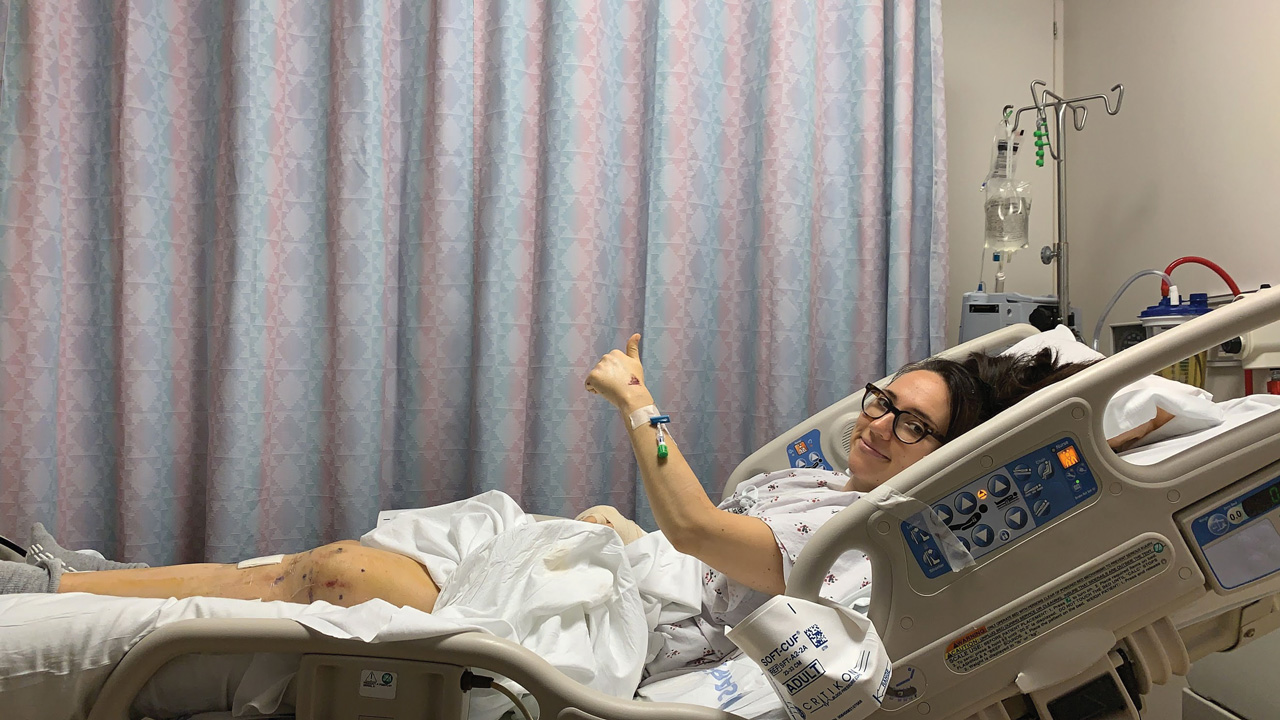
So, I began to consider a career shift. Even though the Hulu gig came with the best title and salary I’d ever received as a comedian, it was only a 13-week contract. I’d soon be unemployed once more and begin my perennial spiral into an existential crisis. Looking around my new house with my new husband and my new responsibilities, I started researching more stable careers like advertising or day trading. Then the lady and her Kia Niro knocked that plan right out of my body.
While recovering from surgery, this saying got stuck in my head: “Tragedy plus time equals comedy.” But I began feeling like the math was off. Could it be that the antidote to tragedy was in fact comedy itself? In that hospital room, with its putrid-green walls and humming monitors, I reversed my decision to shift away from comedy and vowed to pursue it even harder.
After Sam admitted to my father that my injuries were worse than we were letting on, my dad rented a car and drove straight from brunching with drag queens to the hospital. Upon finding me stapled together and gaunt from blood loss, the look on his face rivaled Sam’s for the saddest thing I’ve ever seen (and I’m a refugee, mind you).
“How do you feel?” my dad asked, gently placing his hand on my foot.
“Like I was hit by a car.”
Vladimir winced, not appreciating my dark humor.
I was discharged a couple hours later, a week after the accident. Sam scrounged up an outfit for me to wear home: gray Mizzou sweatpants, the bottoms frayed and discolored from a decade of heavy use, and a short silk robe that he mistook for a blouse. That was the entirety of my look. No underwear, shoes or socks. Clearly, my ensemble was selected by a man whose idea of “fashion” is buying replacement pants only after the old ones meet a five-hole minimum. To top it off, I hadn’t showered in a week. My vibe could best be described as “woman who stands at busy intersection warning that The End is near.”
Despite feeling less attractive than I did as a 14-year-old with a failed DIY bob and a successful mustache, I asked my dad to take a photo. He dutifully pulled out his iPhone and centered it on Sam and me. “Wait,” I said, “Do I look sexy?” My dad and Sam laughed, their tension melting.
With photo evidence that I was indeed being discharged, Sam left to meet our friend Lucas, who had generously offered to help carry me (plus my new wheelchair) into the house. My dad and a nurse’s aide delicately lifted me into his rental car, using strategically placed pillows to pack me in like a crystal butterfly set to ship across the globe. Being outside for the first time in a week was almost as disorienting as not having any underwear on while sitting so close to my father. The 20-minute commute felt like an hour, and it didn’t help that Vladimir, a notoriously cautious driver, was now moving slower than my career.
Back in Boyle Heights, Sam and Lucas delicately hoisted me up the front steps like the convalescent Cleopatra I never knew I wanted to be. Then Sam rolled me into the living room, where the men proceeded to talk about me like I didn’t exist.
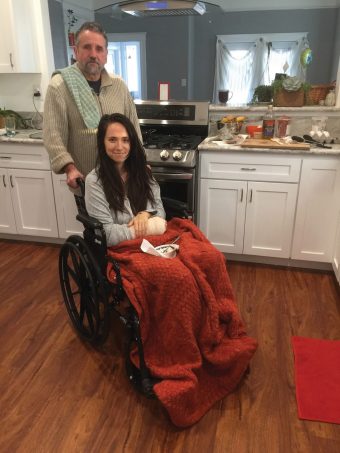
“Should we move her to the couch?” my dad asked.
“She’ll probably fall asleep soon. Maybe the bed?” Sam followed.
“Why don’t you give Dad and Lucas a tour,” I told Sam, gently reminding them that my hearing was still intact. I couldn’t fathom a worse housewarming party, and then my wheelchair suddenly started rolling backward. Before anyone realized what was happening, I lightly butted up against the living room wall. “Ah, well, the floors are crooked,” Sam said, heading over to retrieve me.
To say my recovery was filled with quirky moments such as this one would not be factual. When my healing hit an obstacle, a near-daily occurrence, I was not an ebullient or pleasant person to be around. At times, the crackling intensity of my anger was so alarming that I feared I’d carry it for the rest of my life, burning everyone around me. Still, at the beginning of each day, I vowed to stay true to my goal of looking for the comedy amongst the tragedy. After a while, it became easy to find.
There was the day my industrious father, tired of sitting around and watching me sleep, announced that he was going to fix the garage door. Thirty minutes into my much-desired solitude, I needed to use the bathroom, so I gave my dad a call. As the opening notes of “Sweet Home Alabama,” his ringtone, rang out through the house, I realized he’d left his phone in the kitchen. What if I fell off the couch and broke my other arm!? I grumpily thought as the insipid Lynyrd Skynyrd song played on loop.
After a few rings, the phone went to voicemail. I dialed again, knowing it was a fruitless gesture. “Dad?” I yelled over the obnoxiously plucky guitar. Nothing. “Dad!?” I screamed louder.
By the time Vladimir marched into the living room, nearly an hour later, his face was red, his hair pointed in every direction and a thick line of dust cut across his shirt like a sash. Instead of commenting on his frazzled appearance, I dug myself out from my pillow packaging, worried my bladder would burst. My dad, getting the hint, extended his arms to help transfer me. “You’ll never believe where I was,” he said, as he hooked his elbow through mine, like the in-patient physical therapist taught us.
“With the mole people?” I dryly asked.
“I got trapped in the garage!” he laughed. “One, two … ” my dad counted. On “three” we leaned against each other using our doubled strength to lift my body into a standing position.
Standing there, braced against my petite, Jewish father, who smelled of dust and desperation, I began to laugh. My simmering frustration about needing to rely so heavily on my dad to do things I’d been able to do myself for 30 years evaporating with each giggle. With our shoulders shaking in unison, I laughed so hard I nearly didn’t make it to the bathroom.
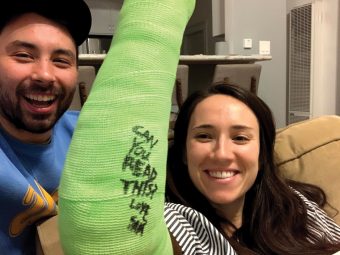
A week after returning home and craving some normalcy, Sam and I decided to make the Herculean effort to go out to dinner for our anniversary. When I suggested a popular Chinese restaurant, Sam whipped out his phone and loaded Yelp. His face lit up, “They’re wheelchair accessible!” then his brow furrowed, “but they don’t take reservations.”
“They wouldn’t make a woman in a wheelchair, sporting a lime-green cast and wallet-sized bandages, wait outside,” I told him.
That evening, I shaved my legs using two salad bowls filled with water, did my makeup left-handed and dug up the only dress that would fit over my cast. “You look beautiful,” Sam told me while struggling with the delicate buttons on my sleeves. He was lying, but I accepted the compliment anyway.
When we got to the restaurant, Sam pushed me past squirmy families and snuggling couples, all of whom politely shuffled out of the way as we neared. I cradled my broken arm in my lap, sensitive to wandering eyes attempting to get a glimpse of my injuries. “Hi, yes. Table for two, please,” Sam told a harried host.
“Forty-five minutes,” he barked back, pointing to a long row of elderly Chinese women in wheelchairs — reminding us that there’s nothing quite as normal as being made to wait your turn.
In late December, it was time for my dad to return home to Chicago. The day before his departure, one of my closest friends, Daniel, came over to help me type my script. My bosses had been very understanding, insisting that I not worry about the deadline. But it was crucial for me to accomplish this career milestone, proving conclusively that comedy really had healing powers.
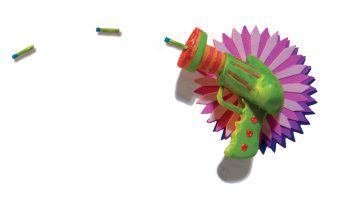 Daniel, whom I met doing stand-up my senior year at Mizzou, had always unapologetically prioritized comedy above all other aspects in life. I knew his presence would force me out of my lingering self-pity. He brought over a gift basket containing some “all-natural” pain pills from his Californian girlfriend and a Nerf gun that I jokingly gifted him years earlier. As we got to work in the living room, I heard something whiz past my ear. There, on the ground in front of me sat a bright green, squishy bullet. As I leaned closer to inspect it, another one hit me in the back. I looked over only to see my father’s head ducking behind the kitchen counter. “If you’re going to shoot at me,” I told him, “at least do it properly.” I grabbed an orange from the counter and delicately balanced it on my head. Without missing a beat, my dad accepted his role as William Tell.
Daniel, whom I met doing stand-up my senior year at Mizzou, had always unapologetically prioritized comedy above all other aspects in life. I knew his presence would force me out of my lingering self-pity. He brought over a gift basket containing some “all-natural” pain pills from his Californian girlfriend and a Nerf gun that I jokingly gifted him years earlier. As we got to work in the living room, I heard something whiz past my ear. There, on the ground in front of me sat a bright green, squishy bullet. As I leaned closer to inspect it, another one hit me in the back. I looked over only to see my father’s head ducking behind the kitchen counter. “If you’re going to shoot at me,” I told him, “at least do it properly.” I grabbed an orange from the counter and delicately balanced it on my head. Without missing a beat, my dad accepted his role as William Tell.
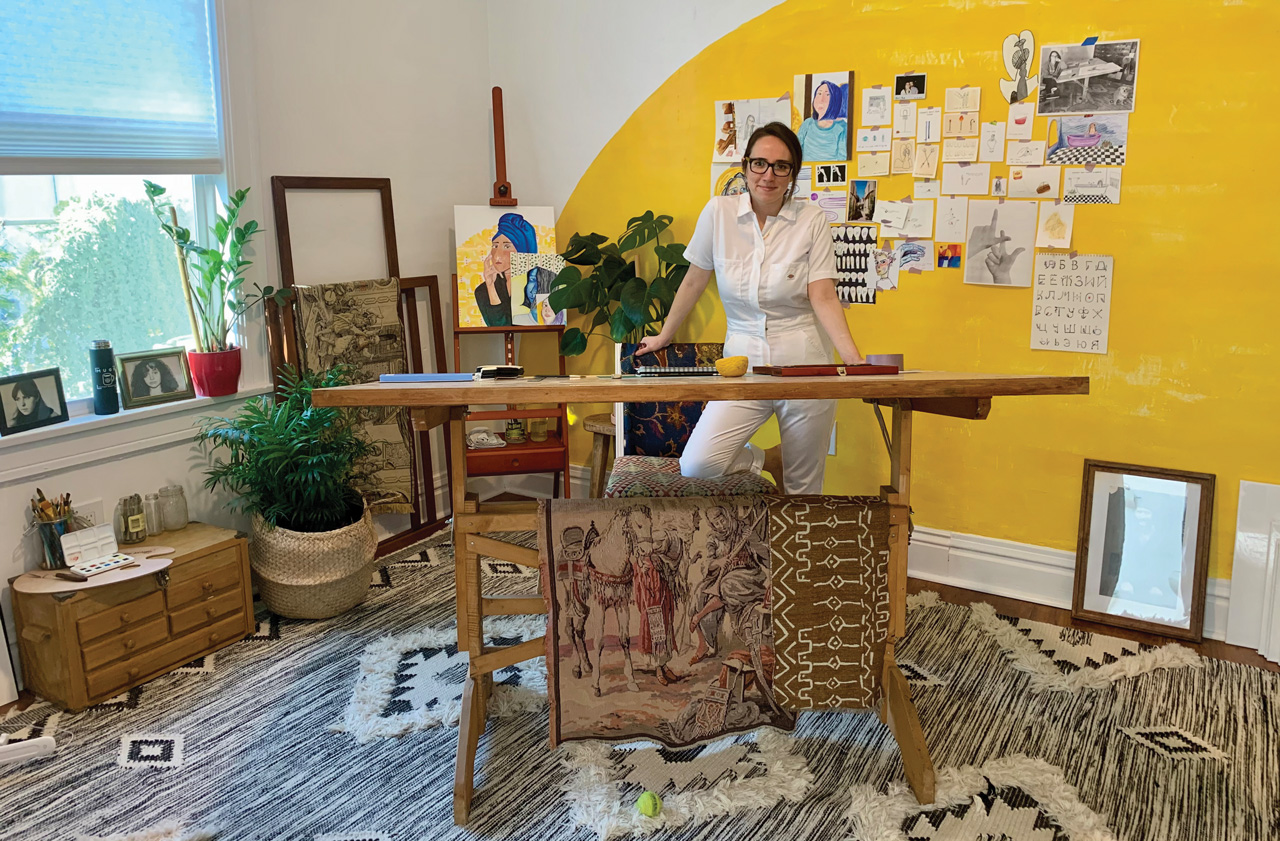
I deeply believe that a life filled with laughter is a life well lived. However, humor becomes more elusive as responsibilities increase with age. That’s why I now treat comedy as I would exercise — something essential to a well-balanced life. Without humor, happiness is in danger of disappearing into the back of one’s consciousness like the screeching ditty of an ice-cream truck.
In the year since my accident, the staples came out, and my bones grew back together. I graduated from the wheelchair to a walker to an independent yet zombie-like gait and finally to one that nearly matches how I used to ambulate. I finished my script and was brought back to write a second one, my contract extended another 13 weeks. My dad managed to fix our garage door. Sam and I adopted a puppy, Roz. She’s at my feet, licking herself as I type.
I can’t say that my commitment to comedy has been easy this past year. Right as I was leaving my cocoon, stretching my atrophied body toward the outside world, the pandemic hit. Everyone I know, myself included, was forced back into isolation. But it’s not so bad here in my cocoon, especially now that I can use the bathroom by myself.
To read more articles like this, become a Mizzou Alumni Association member and receive MIZZOU magazine in your mailbox. Click here to join.



